|
Hiking, Camping and Food Storage
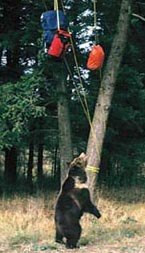 Whether you hike, mountain bike, float rivers or ride horses, there are precautions you should take. Following the suggestions below will help make the journey safer for you, your companions, and wildlife. Remember, all wildlife can be dangerous. Please do not approach or feed wild animals, especially bears. Whether you hike, mountain bike, float rivers or ride horses, there are precautions you should take. Following the suggestions below will help make the journey safer for you, your companions, and wildlife. Remember, all wildlife can be dangerous. Please do not approach or feed wild animals, especially bears.
Common causes of attacks while hiking:
- Not making sufficient noise.
- Approaching or surprising an animal at close range, especially a bear.
- Getting close to a carcass or other food source.
- Startling a female bear with cubs.
- Hiking off trail or at night.
Bear country can also be home to cougars, snakes and other wildlife, such as bison, moose, deer and elk. All wild animals can be dangerous. Always maintain a safe and respectful distance from wildlife. Look for bear signs in your immediate area.
 Reduce the risk of close encounters: Reduce the risk of close encounters:
Let Someone Know: where you are going and when you plan to return.
Keep Children Close: to you and within your immediate sight at all times.
Make Noise: Talk, sing or clap your hands to let a bear know of your presence. Don't rely on bells, usually they are too quiet. Shout often, especially when traveling upwind, near streams and waterfalls, or when you cannot see the path ahead. (avoid thick brush).
Be Alert: Watch for bear sign such as tracks, droppings, diggings, rocks rolled over, scratch marks on trees and logs torn apart. Carry binoculars and scan ahead periodically.
Don't Hike Alone or at Night: Bears and cougars are most active at dawn, dusk and night, but can be encountered any time. Groups of three or more people tend to make more noise and appear more formidable. This makes groups safer than solo hikers.
Stay on Trails: for your safety and to protect the habitat.
Avoid Carcasses: Report dead animals to the nearest ranger station. It is very risky to approach a carcass; a bear may be just out of sight, guarding its food.
Avoid Odorous Items: Leave foods and beverages with strong odors, scented deodorants and lotions and other odorous items at home. A bears acute sense of smell can detect odors from great distances. Dry foods are both lighter and less smelly.
Stay with Your Gear: Don't leave your packs, food or beverages unattended; even food or beverages stored under water may attract bears.
Taking Pets on Hiking Trails is Not Advised: Pets may attract bears and cougars and are not allowed on trails in our National Parks and Refuges. If dogs are permitted, keep them on a short leash to avoid conflicts with wildlife.
 View and Photograph from Established Observation Areas or the Trail: If an animal approaches, back away to maintain a safe distance. View and Photograph from Established Observation Areas or the Trail: If an animal approaches, back away to maintain a safe distance.
Use Binoculars, Spotting Scopes or a Telephoto Lens: When viewing and photographing an animal to avoid stressing the animal.
Bicyclists and Runners should carefully select the areas they are recreating in and be extra alert in cougar, bear and rattlesnake country. Speed and quietness increases risks of a sudden encounter.
Hike at a pace everyone can maintain and stay together. Cougars and some bears behave in a predatory manner and will seek the easiest target. Don't hike ahead or allow someone to fall behind, especially children and pets.
Running to a tree may provoke a bear or cougar to chase you. You cannot outrun them. Bears can run up to 30 mph, up and downhill, while cougars are known for their powerful sprints and jumps. Climb a tree only if it is near and the animal far away. Keep in mind that all black bears and some grizzlies climb trees.
 Rattlesnakes are very seldom seen. They can sense our vibrations from our walking and look for a place to hide, which is often behind rocks, logs or in thick brush. They are usually not aggressive unless they are directly threatened, either deliberately or by accident. To prevent being bitten avoid stepping directly in front of or behind logs and rocks(step on top and away). Before sitting down or picking up supplies from the ground, look around the area carefully. Watch where you put your hands and feet. Most importantly, enjoy snakes at a distance without disturbing them. Rattlesnakes are very seldom seen. They can sense our vibrations from our walking and look for a place to hide, which is often behind rocks, logs or in thick brush. They are usually not aggressive unless they are directly threatened, either deliberately or by accident. To prevent being bitten avoid stepping directly in front of or behind logs and rocks(step on top and away). Before sitting down or picking up supplies from the ground, look around the area carefully. Watch where you put your hands and feet. Most importantly, enjoy snakes at a distance without disturbing them.
 Alligators are found throughout the southeast. Crocodiles are found in parts of Florida. Both prefer to avoid people and will often retreat to water when disturbed. However, mother alligators will aggressively defend their nest and may chase intruders away. Be extra careful around shorelines as they may lay in wait for game. Be aware of trails or drag marks indicating a regularly traveled route. Alligators are found throughout the southeast. Crocodiles are found in parts of Florida. Both prefer to avoid people and will often retreat to water when disturbed. However, mother alligators will aggressively defend their nest and may chase intruders away. Be extra careful around shorelines as they may lay in wait for game. Be aware of trails or drag marks indicating a regularly traveled route.
Always follow local regulations and review trailhead signs before hiking.
Backcountry Camping
(Follow local regulations)
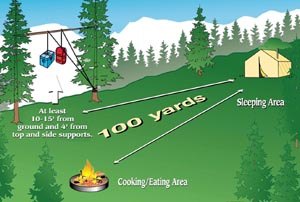 |
- Set up cooking, eating and supply area at least 100 yards from your sleeping area. Store food and odorous items by hanging at least 10 to 15 feet above ground and 4 feet from top and side supports or store in approved, bear resistant containers.
- Select food in individually sealed packages. Plan meals carefully to prevent leftovers.
- Store pet food, livestock feed and garbage the same as food. Never bury it; pack it out.
- Strain food particles from dishwater using a fine mesh screen and store with garbage. Dump dishwater at least 100 yards from your sleeping area. Food odors may attract bears and other animals.
- Keep sleeping bags and tents completely free of food, food odors and beverages.
- Store personal items (such as deodorants, toothpaste, soap and lotions) with food and garbage when not in use. Any odorous product may attract bears.
- Camp in open areas away from trails, thick brush, berry patches, spawning streams or carcasses. Sleep in a tent for increased safety.
- Keep a flashlight and bear spray readily available.
- Wash your hands after cooking, eating or handling fish or game. Minimize odors.
- Do not sleep in the clothes you cook in.
Rehearse what you and others in your group will do day or night if a bear appears in your camp or while you're hiking. Review local regulations.
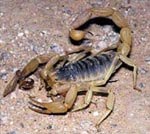 When gathering firewood and picking up belongings off the ground, be cautious of snakes, scorpions and other insects that are often hard to detect. When gathering firewood and picking up belongings off the ground, be cautious of snakes, scorpions and other insects that are often hard to detect.
Check for insects in your bedding, clothing and footwear carefully before using.
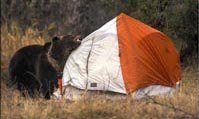 If a bear enters your campsite or your sleeping and cooking areas seeking food, it is acting in a predatory manner. Group together and retreat to a place of safety. If your attempts from a distance of yelling and throwing things does not cause the bear to retreat, leave the area immediately. Report the incident to the wildlife management agency and retrieve your personal belongings with their assistance. If a bear enters your campsite or your sleeping and cooking areas seeking food, it is acting in a predatory manner. Group together and retreat to a place of safety. If your attempts from a distance of yelling and throwing things does not cause the bear to retreat, leave the area immediately. Report the incident to the wildlife management agency and retrieve your personal belongings with their assistance.
If a bear attacks you or a companion in your campsite or eating area, either during the day or night, consider it a predatory confrontation and aggressively fight back with everything possible.
Campgrounds
(Follow local regulations)
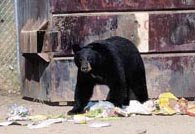 Don't be careless with food or garbage when camping in a campground. Wild animals, especially bears, may wander through at any time of day or night. Wild animals near a campground are more likely to be habituated or food-conditioned (used to people and their food). Having lost their natural fear of humans, these animals often become increasingly aggressive in their attempts to obtain human, pet and livestock food. Don't be careless with food or garbage when camping in a campground. Wild animals, especially bears, may wander through at any time of day or night. Wild animals near a campground are more likely to be habituated or food-conditioned (used to people and their food). Having lost their natural fear of humans, these animals often become increasingly aggressive in their attempts to obtain human, pet and livestock food.
- Protect yourself and others and prevent wild animals from obtaining human food and garbage by keeping a clean camp. Deposit all garbage in wildlife-resistant trash containers.
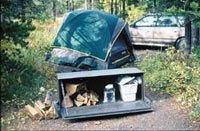
Keep all food and food-related items inside a closed, hard-sided vehicle or special bear-resistant container except when preparing or eating food. Ice chests, coolers, boxes, cans, tents and soft-sided campers are not bear-resistant!
- Store pet food and livestock feed the same as human food, out of reach from bears and other animals.
- Keep pets on a leash while with you or inside a cool, well-ventilated vehicle. Pets may threaten and harass wildlife and can lead predators to your camp. Pets are not allowed on hiking trails in most parks and refuges. Do not leave pets unattended in bear country!
- When walking in a campground at night, always carry bear spray, use a flashlight and stay alert.
- Ask campers who are not observing precautions to clean up their camp for the safety of visitors and wildlife.
- Remove all food and garbage from campground storage boxes before you leave.
- Watch for snakes when picking up firewood or gear from the ground.
Always keep a clean camp.
Use a designated camping area and set up tents with space between them. Keep a flashlight and bear spray readily available.
Animals traveling through campgrounds should never be assumed to be tame and should not be approached or fed.
Immediately notify the campground host if you encounter a bear, cougar or rattlesnake in or near your campground area.
Food Regulations
- Human food and beverages, horse feeds, dog food, etc. either in possession of left unattended must be kept unavailable to bears unless being consumed, prepared for consumption or transported.
- When departing an area, remove all food and refuse from any bear resistant containers left in the area.
- Do not sleep in the same clothes that you handled game or cooked in.
- Keep sleeping bags, tents and sleeping area free of food and beverage odors.
- Keep bear spray readily available.
|